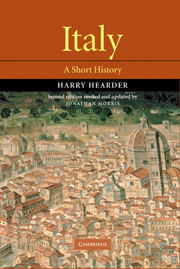Book contents
- Frontmatter
- Contents
- List of illustrations
- Preface
- 1 Italy in the classical world
- 2 The early Middle Ages
- 3 The high Middle Ages
- 4 The Renaissance
- 5 The political and cultural eclipse of Italy
- 6 The Risorgimento, 1790–1861
- 7 From Unification to Fascism, 1861–1922
- 8 The Fascist disaster, 1922–45
- 9 Italy since the Second World War, 1945–80
- Epilogue: From the First to the Second Republic: Italy 1980–2001
- A brief guide to further reading
- Index
Epilogue: From the First to the Second Republic: Italy 1980–2001
Published online by Cambridge University Press: 05 February 2015
- Frontmatter
- Contents
- List of illustrations
- Preface
- 1 Italy in the classical world
- 2 The early Middle Ages
- 3 The high Middle Ages
- 4 The Renaissance
- 5 The political and cultural eclipse of Italy
- 6 The Risorgimento, 1790–1861
- 7 From Unification to Fascism, 1861–1922
- 8 The Fascist disaster, 1922–45
- 9 Italy since the Second World War, 1945–80
- Epilogue: From the First to the Second Republic: Italy 1980–2001
- A brief guide to further reading
- Index
Summary
Within a few years of the late Harry Hearder completing this book, both the Christian Democrat and Communist parties ceased to exist. This epilogue continues his history of Italy up to the end of the twentieth century, covering the meltdown of the post-war political system, and the new political forces that emerged from this.
The ‘economic miracle’ led to the advent of a secular, consumer society whose stress on individualism challenged the collective sub-cultures underlying both Communism and Christian Democracy. The 1970s saw the enactment of a series of civil reforms, notably the legalisation of divorce and abortion, championed by the tiny Radical party. These were passed through the combined support of ‘lay’ parties in the governing coalition (such as the Socialists), and the Communist opposition outside it. The Christian Democrats sponsored national referenda against divorce in 1974 and abortion in 1981, but on both occasions the populace voted in favour of reform – the first explicit rejection of the Christian Democrats at the polls. In the 1980s, as its popularity declined, the DC became increasingly reliant on its strongholds in the south.
The Communist vote also fell throughout the decade, reflecting both internal and global developments. In 1981, Berlinguer declared that the Soviet-backed military coup in Poland was proof that the Soviet revolution had run its course, but this only intensified the need for the PCI to elaborate a new strategy – a task neither Berlinguer, who died in 1984, nor his successors were to prove up to.
- Type
- Chapter
- Information
- ItalyA Short History, pp. 263 - 276Publisher: Cambridge University PressPrint publication year: 2001



